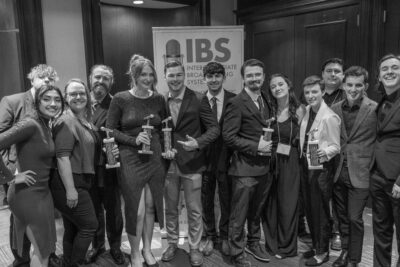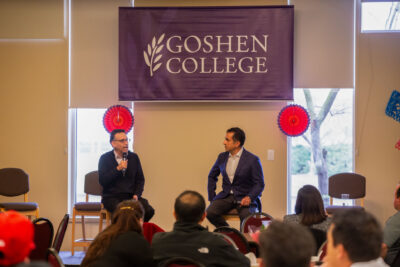Jair Hernandez, a sophomore public relations major from Goshen, won first place in the annual C. Henry Smith Peace Oratorical Contest on Feb. 22 with his speech “Migrant Farm Workers.” Hernandez was one of six Goshen College students who spoke about a variety of peace and justice issues during the contest.
Hernandez received a $500 prize, plus a chance to enter Mennonite Central Committee’s C. Henry Smith Peace Oratorical Contest. Taking second place, and the $250 prize, was SaeJin Lee, a fifth-year senior Bible and religion and art double major from Elkhart, Ind. Her speech was titled “Rethinking SST: Beyond a Three-Month Long Requirement to a Life-Long Commitment to Intercultural Intentionality.”
During his speech, Hernandez reflected on his time in Toledo, Ohio, where he participated in the college’s Latino Study-Service Term last summer. While in Toledo, Hernandez spent time with migrant farm workers and got a glimpse of their every day lives as they dealt with bedbug infested living conditions, frequent moves and harsh work.
Hernandez gave the example of Urbano Ramirez Miranda, a migrant worker who died while working on a hot field in North Carolina. His body wasn’t discovered until ten days after he died, propped up and decomposing under a magnolia tree. Hernandez pointed out that you don’t have to go far to find migrant workers—there are some as close as Kercher’s Orchard on County Road 38 in Goshen.
“Migrant farm workers really are the invisible backbone of the American agricultural system,” said Hernandez.
He concluded his speak with a quote from Cesar Chavez: “The fight is never about grapes or lettuce. It is always about people.”
In her second-place speech, Lee questioned the college’s intercultural intentionality on campus. She noted that last’s year’s cultural audit reflected “a gap between what is believed on a theoretical level, and what is implemented on a personal level.”
Lee surveyed several international students on campus, and discovered that most found it difficult to have close relationships with American students. Some shared stories of exclusiveness among American students, and as a Korean-American herself, Lee related to a feeling of separation.
“Our SST experience overseas must be in unity with our interactions here on campus,” said Lee.
A private donation from Hans and Bonnie Hillerbrand, former C. Henry Smith competitors, allowed for the contest winners to receive a cash prize substantially larger than those of previous years.
The speeches were judged on their adherence to a social justice theme, use of supporting evidence and organization, as well as on the elements of presentation such as vocal variety, eye contact and spiritedness.
The trust of C. Henry Smith, a Mennonite historian and professor at Goshen and Bluffton (Ohio) colleges, funds the contest, which has been party of Goshen College’s history since the early 1900s.
BREAKOUT BOX:
Other students who spoke in the annual C. Henry Smith Peace Oratorical Contest on Tuesday, Feb. 22 were:
Jeffery Moore, a sophomore communication major from Ashland, Ohio, who spoke about how labeling simplifies a person’s character in his speech “The Games We Play: How Labeling Leads to Violence.”
Karina Rohrer-Meck, a sophomore nursing major from Archbold, Ohio, who talked about texting and driving in her speech “Everyday Justice In Your Hands.”
Madi Ouedraogo, a sophomore TESOL major from Ouagadougou, Burkina Faso, who talked about how lack of education is at the root of the injustice in Africa in his speech “A Peaceful Future for Africa Requires Education.”
Michael Fecher, a junior molecular biology and biochemistry major from Goshen, who spoke about issues relating to the campus divide on the recent decision to play the national anthem at some sporting events. He speech was titled “The National Anthem and the Anabaptist Vision.”

